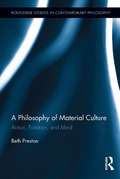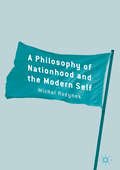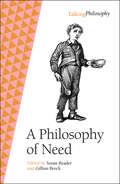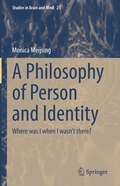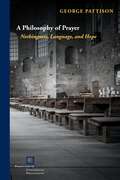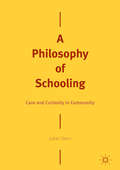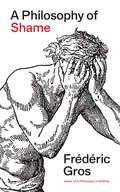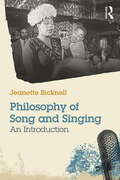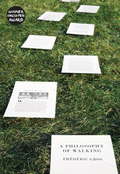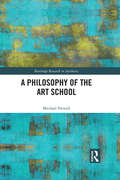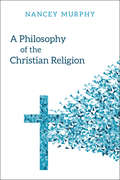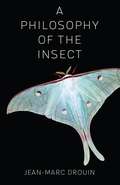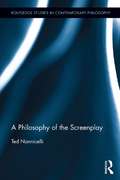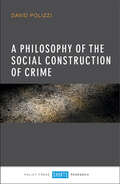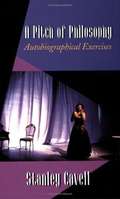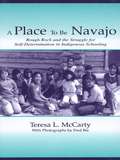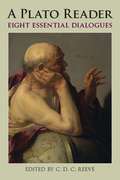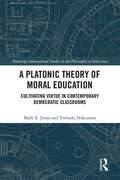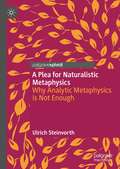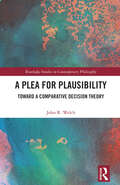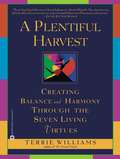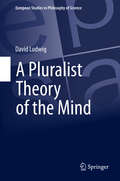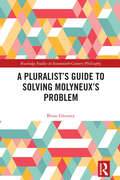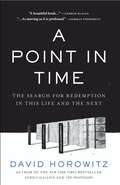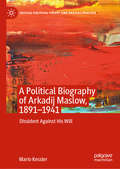- Table View
- List View
A Philosophy of Material Culture: Action, Function, and Mind (Routledge Studies in Contemporary Philosophy #48)
by Beth PrestonThis book focuses on material culture as a subject of philosophical inquiry and promotes the philosophical study of material culture by articulating some of the central and difficult issues raised by this topic and providing innovative solutions to them, most notably an account of improvised action and a non-intentionalist account of function in material culture. Preston argues that material culture essentially involves activities of production and use; she therefore adopts an action-theoretic foundation for a philosophy of material culture. Part 1 illustrates this foundation through a critique, revision, and extension of existing philosophical theories of action. Part 2 investigates a salient feature of material culture itself—its functionality. A basic account of function in material culture is constructed by revising and extending existing theories of biological function to fit the cultural case. Here the adjustments are for the most part necessitated by special features of function in material culture. These two parts of the project are held together by a trio of overarching themes: the relationship between individual and society, the problem of centralized control, and creativity.
A Philosophy of Nationhood and the Modern Self
by Michal RozynekThis book delves into the philosophical presuppositions of modern political agency. Michal Rozynek explores the place of nationalism in an increasingly cosmopolitan world by approaching the fundamental questions of modern subjectivity from a new angle. Taking as a starting point the transformations of the modern self, this volume argues that the project of modernity leads to an unresolvable tension within the self-- one which seemingly jeopardizes our ability to participate in a public world. Rozynek goes on to show how nationhood can offer a resolution to this tension, building on the pioneering work of Liah Greenfeld. Far from being a defense of tribalism, this book attempts to tackle both the questions of national solidarity and cosmopolitan duties, by problematizing the account of nationalism in contemporary political theory and advocating a revised model of universalism.
A Philosophy of Need (Talking Philosophy)
by Gillian Brock Soran ReaderAppeals to need abound in everyday discussion. People make claims about their own needs all the time, and they do so in a way that suggests these should have a certain moral force. Needs also play an important role in contemporary popular discourse about social justice, climate change, obligations to future generations, dealing fairly with refugees, treating animals humanely, and critiques of consumerist lifestyles – to name just a few of the many examples. The idea of need is present in an increasing number of debates and domains. There is interest in need from several disciplines, not just philosophy, which also include psychology, economics, political science, social work and sociology. This volume, then, offers a fine introduction to an increasingly important concept in day-to-day life. In a new Foreword, Gillian Brock discusses the continuing significance of several innovative chapters in the book, indicating how they presaged new directions in philosophical conversation.
A Philosophy of Person and Identity: Where was I when I wasn’t there? (Studies in Brain and Mind #21)
by Monica MeijsingThis book discusses the themes of personhood and personal identity. It argues that while there is a metaphysical answer to the question of personal identity, there is no metaphysical answer to the question of what constitutes a person. The author argues against both body-mind dualism and physicalism and also against the idea that there is some metaphysically real category of persons distinct from the category of human beings or human organisms. Instead, the author presents neutral-monist, autopoietic-enactivist kind of metaphysics of the human being, and a relational, and completely human-dependent notion of a person. The tools used in these arguments include conceptual argumentation and empirical case studies. Using both personal experiences and studies of cultures all over the world, the author examines dualism between mind and body. The author discusses real people who seem to live a Cartesian life, as somehow disembodied minds as well as the concept of the person. The author uses the concluding chapters to present their own views arguing that questions about our identity should be separated from questions of our personhood as well as the concept of personhood. This volume is of interest to scholars of philosophy of mind.
A Philosophy of Prayer: Nothingness, Language, and Hope (Perspectives in Continental Philosophy)
by George PattisonExploring the silence of prayer in Post-Kantian philosophy and traditional spiritualityA Philosophy of Prayer explores prayer within the perspective of post-Kantian philosophy. Against a background of traditional sources, including Augustine, The Cloud of Unknowing, and the seventeenth-century French school of spirituality, the book uses Schleiermacher, Kierkegaard, Dostoevsky, Heidegger, Berdyaev, Tillich, Marcel, Simone Weil, Emmanuel Levinas, and Jean- Louis Chrétien to provide an interpretation of what is meant by the passivity and self-annihilation of the praying self, suggesting an “apophatics of the personality.”Pattison pays particular attention to the question of language and the implications of the role given to silence in traditional texts, arguing that language remains a defining element of the human–God relationship and that silence is not to be construed as the negation of language but as the revelation of the depth of language itself. The basic structure of prayer is shown to be implicitly eschatological, oriented toward a coming kingdom of justice and peace while, at the same time, expressing a deep desire for ontological homecoming, a tension manifest in, respectively, Levinas and Heidegger. On Pattison’s reading, prayer calls for and develops a particular orientation of the self toward existence, corresponding to the virtue of humility, long understood as the basic Christian virtue. This is shown to be in tension with modernity’s commitment to strong versions of autonomy. However, the choice of humility is not presented as the reinstatement of religious heteronomy but as a free choice of the praying self.
A Philosophy of Schooling: Care and Curiosity in Community
by Julian SternThis book provides an optimistic account of the value and role of schooling. Schooling is a common but not universal approach to education and has need of its own distinctive justification, in contrast to other approaches such as home-based or work-based education. The book tackles and rejects the various large-scale ‘functional’ theories of schooling which continue to dominate current debates and policies, such as schooling supporting employment and the economy, or developing citizenship. Instead, it argues that schooling and schools should be viewed as places to learn community within and through community. The lived reality of relationships within schools, based on care and curiosity, is as strong as ever: and upon this foundation is built an original philosophy of schooling. This reflective book will appeal to students and scholars of philosophy of education and to all professionals concerned with schools.
A Philosophy of Shame: A Revolutionary Emotion
by Frédéric GrosAn original reflection on shame as the central feeling of our age — the expression of an anger that is the necessary condition for new strugglesCan shame become a source of political strength? Faced with injustice, growing inequality and systemic violence, we cry out in shame. We feel ashamed of obscene wealth amid wider deprivation. We feel ashamed of humanity for its ruthless and relentless exploitation of the earth. We feel ashamed of the racism and sexism that permeate society and our everyday lives.This difficult emotion is not just sadness or a withdrawal into oneself, nor is it a paralysing sense of inadequacy. As Frédéric Gros argues in A Philosophy of Shame, it arises when our perception of reality rejects passivity and resignation and instead embraces imagination. Shame thus becomes the expression of an anger that is a powerful, transformative force —one that assumes a radical character.In dialogue with authors such as Primo Levi, Annie Ernaux, Virginie Despentes and James Baldwin, Gros explores a concept that is still little understood in its anthropological, moral, psychological and political depths. Shame is a revolutionary sentiment because it lies at the foundation of any path of subjective recognition, transformation and struggle.
A Philosophy of Song and Singing: An Introduction
by Jeanette BicknellIn Philosophy of Song and Singing: An Introduction, Jeanette Bicknell explores key aesthetic, ethical, and other philosophical questions that have not yet been thoroughly researched by philosophers, musicologists, or scientists. Issues addressed include: The relationship between the meaning of a song’s words and its music The performer’s role and the ensuing gender complications, social ontology, and personal identity The performer’s ethical obligations to audiences, composers, lyricists, and those for whom the material holds particular significance The metaphysical status of isolated solo performances compared to the continuous singing of opera or the interrupted singing of stage and screen musicals Each chapter focuses on one major musical example and includes several shorter discussions of other selections. All have been chosen for their illustrative power and their accessibility for any interested reader and are readily available.
A Philosophy of Walking
by John Howe Clifford Harper Frederic Gros"It is only ideas gained from walking that have any worth." --Nietzsche In A Philosophy of Walking, a bestseller in France, leading thinker Frédéric Gros charts the many different ways we get from A to B - the pilgrimage, the promenade, the protest march, the nature ramble - and reveals what they say about us. Gros draws attention to other thinkers who also saw walking as something central to their practice. On his travels he ponders Thoreau's eager seclusion in Walden Woods; the reason Rimbaud walked in a fury, while Nerval rambled to cure his melancholy. He shows us how Rousseau walked in order to think, while Nietzsche wandered the mountainside to write. In contrast, Kant marched through his hometown every day, exactly at the same hour, to escape the compulsion of thought. Brilliant and erudite, A Philosophy of Walking is an entertaining and insightful manifesto for putting one foot in front of the other.From the Hardcover edition.
A Philosophy of the Art School (Routledge Research in Aesthetics)
by Michael NewallUntil now, research on art schools has been largely occupied with the facts of particular schools and teachers. This book presents a philosophical account of the underlying practices and ideas that have come to shape contemporary art school teaching in the UK, US and Europe. It analyses two models that, hidden beneath the diversity of contemporary artist training, have come to dominate art schools. The first of these is essentially an old approach: a training guided by the artistic values of a single artist-teacher. The second dates from the 1960s, and is based around the group crit, in which diverse voices contribute to an artist’s development. Understanding the underlying principles and possibilities of these two models, which sit together in an uneasy tension, gives new insights into the character of contemporary art school teaching, demonstrating how art schools shape art and artists, how they can be a potent engine of creativity in contemporary culture and how they contribute to artistic research. A Philosophy of the Art School draws on first-hand accounts of art school teaching, and is deeply informed by disciplines ranging from art history and art theory, to the philosophy of art, education and creativity.
A Philosophy of the Christian Religion: An Introduction
by Nancey MurphyEach field of study comes with its own set of questions; each period of time refines and redirects those questions. The Christian religion as we find it in the twenty-first century presents a unique set of problems to be solved and questions to be answered. In this introduction to the philosophy of the Christian religion, eminent philosopher and theologian Nancey Murphy applies the tools of philosophical analysis to a set of core yet contemporary religious questions: what does our historical moment mean for the possibility of knowing God? Is faith still possible? Does God intervene in human history? Is there such a thing as universal knowledge of God? <P><P> Written with the needs of students encountering the philosophy of religion for the first time in mind, this book provides a comprehensive introduction to the fundamental questions inherent in Christian faith. Murphy also provides tools for how to answer those questions.
A Philosophy of the Insect
by Jean-Marc DrouinThe world of insects is at once beneath our feet and unfathomably alien. Small and innumerable, insects surround and disrupt us even as we scarcely pay them any mind. Insects confront us with the limits of what is imaginable, while at the same time being essential to the everyday functioning of all terrestrial ecosystems.In this book, the philosopher and historian of science Jean-Marc Drouin contends that insects pose a fundamental challenge to philosophy. Exploring the questions of what insects are and what scientific, aesthetic, ethical, and historical relationships they have with humanity, he argues that they force us to reconsider our ideas of the animal and the social. He traces the role that insects have played in language, mythology, literature, entomology, sociobiology, and taxonomy over the centuries. Drouin emphasizes the links between humanistic and scientific approaches—how we have projected human roles onto insects and seen ourselves in insect form. Caught between the animal and plant kingdoms, insects force us to confront and reevaluate our notions of gender, family, society, struggle, the division of labor, social organization, and individual and collective intelligence. A remarkably original and thought-provoking work, A Philosophy of the Insect is an important book for animal studies, environmental ethics, and the history and philosophy of science.
A Philosophy of the Screenplay (Routledge Studies in Contemporary Philosophy)
by Ted NannicelliRecently, scholars in a variety of disciplines—including philosophy, film and media studies, and literary studies—have become interested in the aesthetics, definition, and ontology of the screenplay. To this end, this volume addresses the fundamental philosophical questions about the nature of the screenplay: What is a screenplay? Is the screenplay art—more specifically, literature? What kind of a thing is a screenplay? Nannicelli argues that the screenplay is a kind of artefact; as such, its boundaries are determined collectively by screenwriters, and its ontological nature is determined collectively by both writers and readers of screenplays. Any plausible philosophical account of the screenplay must be strictly constrained by our collective creative and appreciative practices, and must recognize that those practices indicate that at least some screenplays are artworks.
A Philosophy of the Social Construction of Crime
by David PolizziIt is well known that the social definition of individuals and ethnic groups helps legitimize how they are addressed by law enforcement. The philosophy of the social construction of crime and criminal behaviour reflects how individuals, such as police officers, construct meaning from the perspective from which they emerge, which in turn influences their law enforcement outlook. In the field, this is generally viewed through a positivist frame of reference which fails to critically examine assumptions of approach and practice. Written by an international specialist in this area, this is the first book which attempts to situate the social construction of crime and criminal behaviour within the philosophical context of phenomenology and how these constructions help inform, and ultimately justify, the policies employed to address them. Challenging existing thinking, this is essential reading for academics and students interested in social theory and theories of criminology.
A Pitch of Philosophy: Autobiographical Exercises
by Stanley CavellThis book is an invitation to the life of philosophy in the United States, as Emerson once lived it and as Stanley Cavell now lives it--in all its topographical ambiguity.
A Place to Be Navajo: Rough Rock and the Struggle for Self-Determination in Indigenous Schooling (Sociocultural, Political, and Historical Studies in Education)
by Teresa L. McCartyA Place To Be Navajo is the only book-length ethnographic account of a revolutionary Indigenous self-determination movement that began in 1966 with the Rough Rock Demonstration School. Called Diné Bi'ólta', The People's School, in recognition of its status as the first American Indian community-controlled school, Rough Rock was the first to teach in the Native language and to produce a body of quality children's literature by and about Navajo people. These innovations have positioned the school as a leader in American Indian and bilingual/bicultural education and have enabled school participants to wield considerable influence on national policy. This book is a critical life history of this singular school and community. McCarty's account grows out of 20 years of ethnographic work by the author with the Diné (Navajo) community of Rough Rock. The story is told primarily through written text, but also through the striking black-and-white images of photographer Fred Bia, a member of the Rough Rock community. Unlike most accounts of Indigenous schooling, this study involves the active participation of Navajo community members. Their oral testimony and that of other leaders in Indigenous/Navajo education frame and texture the account. Informed by critical theories of education, this book is not just the story of a single school and community. It is also an inquiry into the larger struggle for self-determination by Indigenous and other minoritized communities, raising issues of identity, voice, and community empowerment. A Place To Be Navajo asks whether school can be a place where children learn, question, and grow in an environment that values and builds upon who they are. The author argues that the questions Rough Rock raises, and the responses they summon, implicate us all.
A Plato Reader: Eight Essential Dialogues
by Plato C. D. ReeveA Plato Reader offers eight of Plato's best-known works--Euthyphro, Apology, Crito, Meno, Phaedo, Symposium, Phaedrus, and Republic--unabridged, expertly introduced and annotated, and in widely admired translations by C. D. C. Reeve, G. M. A. Grube, Alexander Nehamas, and Paul Woodruff.The collection features Socrates as its central character and a model of the examined life. Its range allows us to see him in action in very different settings and philosophical modes: from the elenctic Socrates of the Meno and the dialogues concerning his trial and death, to the erotic Socrates of the Symposium and Phaedrus, to the dialectician of the Republic.Of Reeve's translation of this final masterpiece, Lloyd P. Gerson writes, "Taking full advantage of S. R. Slings' new Greek text of the Republic, Reeve has given us a translation both accurate and limpid. Loving attention to detail and deep familiarity with Plato's thought are evident on every page. Reeve's brilliant decision to cast the dialogue into direct speech produces a compelling impression of immediacy unmatched by other English translations currently available."
A Platonic Theory of Moral Education: Cultivating Virtue in Contemporary Democratic Classrooms (Routledge International Studies in the Philosophy of Education)
by Mark E. Jonas Yoshiaki NakazawaDiscussing Plato’s views on knowledge, recollection, dialogue, and epiphany, this ambitious volume offers a systematic analysis of the ways that Platonic approaches to education can help students navigate today’s increasingly complex moral environment. Though interest in Platonic education may have waned due to a perceived view of Platonic scholarship as wholly impractical, this volume addresses common misunderstandings of Plato’s work and highlights the contemporary relevance of Plato’s ideas to contemporary moral education. Building on philosophical interpretations, the book argues persuasively that educators might employ Platonic themes and dialogue in the classroom. Split into two parts, the book looks first to contextualise Plato’s theory of moral education within political, ethical, and educational frameworks. Equipped with this knowledge, part two then offers contemporary educators the strategies needed for implementing Plato’s educational theory within the pluralistic, democratic classroom setting. A Platonic Theory of Moral Education will be of interest to academics, researchers, and post-graduate students in the fields of: ethics; Plato scholarship; moral psychology; educational foundations; and the philosophy of education. This book would also benefit graduate students and scholars in teacher education. Mark E. Jonas is Professor of Education and Professor of Philosophy (by courtesy) at Wheaton College, US. Yoshiaki Nakazawa is Assistant Professor of Education at University of Dallas, US.
A Plea for Naturalistic Metaphysics: Why Analytic Metaphysics is Not Enough
by Ulrich SteinvorthIn this small book, Ulrich Steinvorth describes the reasons why analytic philosophy, which started as an anti-metaphysical project, has become a strong advocate of metaphysics, and why it must become synthetic, normative, and naturalistic. Steinvorth argues that self-regulation is the common property of all being, that we can talk of an increase or escalation of self-regulation in the evolution of being, and that self-regulation becomes self-determination in man. Considering objections to this view related to questions of free will, consciousness, the naturalistic fallacy, and teleology, he draws on cybernetics, dual process theory, physical cosmology, and Leibniz’s (“demiurgic”) idea of measuring the goodness of a world by the number of possibilities opened up by the world. To test his approach and show its political relevance, he applies it to political liberalism.
A Plea for Plausibility: Toward a Comparative Decision Theory (Routledge Studies in Contemporary Philosophy)
by John R. WelchThis book develops an original theory of decision-making based on the concept of plausibility. The author advocates plausible reasoning as a general philosophical method and demonstrates how it can be applied to problems in argumentation theory, scientific theory choice, risk management, ethics, law, economics, and epistemology. Human decisions are conditioned by formidable uncertainty. The standard resource for dealing rationally with uncertainty is the mathematical concept of probability. The probability calculus is well-known, but since the numerical demands for applying it cannot usually be met, it is not widely applicable. By contrast, the concept of plausibility is widely applicable, but it is little known. This book relies on a generalized concept of plausibility whose strength is its adaptability. The adaptability is due to a novel form of decision theory that takes plausibilities as inputs. This form of decision theory remains applicable to decisions informed by sharp probabilities and utilities, but it can also be applied to decisions that must be made without them. It can aid in the rationally critical enterprise of discriminating good arguments from bad, and this can foster philosophical progress. A Plea for Plausibility will be of interest to scholars and advanced students working in argumentation theory, philosophy of science, ethics, epistemology, economics, law, and risk management.
A Plentiful Harvest: Creating Balance and Harmony Through the Seven Living Virtues
by Terrie WilliamsSimple Abundance meets One Day My Soul Just Opened Up in Terrie Williams' inspirational guide for African American women seeking more from their lives.
A Pluralist Theory of the Mind (European Studies in Philosophy of Science #2)
by David LudwigThis book challenges common debates in philosophy of mind by questioning the framework of placement problems in contemporary metaphysics. The author argues that placement problems arise when exactly one fundamental ontology serves as the base for all entities, and will propose a pluralist alternative that takes the diversity of our conceptual resources and ontologies seriously. This general pluralist account is applied to issues in philosophy of mind to argue that contemporary debates about the mind-body problem are built on this problematic framework of placement problems. The starting point is the plurality of ontologies in scientific practice. Not only can we describe the world in terms of physical, biological, or psychological ontologies, but any serious engagement with scientific ontologies will identify more specific ontologies in each domain. For example, there is not one unified ontology for biology, but rather a diversity of scientific specializations with different ontological needs. Based on this account of scientific practice the author argues that there is no reason to assume that ontological unification must be possible everywhere. Without this ideal, the scope of ontological unification turns out to be an open empirical question and there is no need to present unification failures as philosophically puzzling "placement problems".
A Pluralist’s Guide to Solving Molyneux’s Problem (Routledge Studies in Seventeenth-Century Philosophy)
by Brian GlenneyThis book presents a novel pluralist strategy for answering Molyneux’s 300+-year-old conundrum: Would a person, born blind but given sight, identify a shape previously known only by their touch? The author interweaves historical scholarship with contemporary philosophical work and empirical research on animal, infant, and adult human perception.The author argues that we need a new approach to Molyneux’s problem because we do not know what the problem is really about, and it is untestable because a Molyneux subject cannot be physically realized. He criticizes Molyneux’s question for its simplistic taxonomy of "the blind" that groups significant individual differences into a singular ontology. Research in the cognitive sciences confirms that various kinds of blindness can co-occur, such as ocular, cortical, and psychological blindness. Therefore, the author adopts an explanatory pluralism for answering Molyneux’s problem, which includes no, yes, and "no answer" answers according to the domain of inquiry being used. This account provides a research-based answer to a long-standing problem using previously unheeded insights particularly from animal crossmodal perception studies to retell a more complex story of perception: its levels of explanation and integration.A Pluralist’s Guide to Solving Molyneux’s Problem will be of interest to researchers and advanced students working in comparative psychology, epistemology, history of philosophy, philosophy of perception.
A Point in Time: The Search for Redemption in This Life and the Next
by David HorowitzA Matter of Life and DeathNew York Times bestselling author David Horowitz is famous for his conversion from 1960s radicalism. In A Point in Time, his lyrical yet startling new book, he offers meditations on an even deeper conversion, one which touches on the very essence of every human life.Part memoir and part philosophical reflection, A Point in Time focuses on man's inevitable search for meaning-and how for those without religious belief, that search often leads to a faith in historical progress, one that is bound to disappoint. Horowitz agrees with Marcus Aurelius, whose stoic philosophy provides a focal point for the book, "He who has seen present things has seen all, both everything that has taken place from all eternity and everything that will be for time without end...."Horowitz remembers his father, a political radical who put his faith in just such a redemptive future. He examines this hope through the other great figure who organizes these reflections, the Russian novelist Fyodor Dostoevsky, whose writings foreshadowed the great tragedies of the social revolutions to come. Horowitz draws on eternal themes: the need we have to make sense out of the lives we have been given, our desire to repair the injustices we encounter, and the consequences of our mortality.Interweaving episodes of his own life with the writings of the philosopher and the novelist, Horowitz explores how we provide meaning to an apparently senseless existence and the dire consequences that follow from seeking to redeem it by attempting to make a perfect world out of the imperfect one in which we find ourselves.Praise forA POINT IN TIME"David Horowitz is so powerful a polemicist that it is often forgotten how beautifully he writes. For the same reason, the deeply considered philosophical perspective and the wide-ranging erudition underlying his political passions are just as often overlooked. But it is precisely these qualities that come to the fore and shine through so brilliantly in the linked meditations that make up A Point in Time. With Marcus Aurelius, Ecclesiastes, and Dostoevsky as its guides, this little book boldly ventures into an exploration of first things and last that is as moving as it is profound."-NORMAN PODHORETZ, author of Why Are Jews Liberals?"A beautiful book, both sad and uplifting. Moving in turns from the intimate to the universal, Horowitz not only explores but also embodies the dignity of the tragic worldview. A Point in Time is a poignant and elegiac reflection on life from a man who bears the burden of unknowing with courage and grace."-ANDREW KLAVAN, author of True Crime and Empire of Lies"Emulating Marcus Aurelius, David Horowitz has produced a meditation on facing death that is poignant and wise. Whether invoking the Stoics or reflecting on his own father, he helps us think through that most basic of all questions: what is it that can give meaning to our existence?"-WALTER ISAACSON, author of Einstein"I have admired David Horowitz for decades. He has taught me many important lessons. But never have I been so moved by his writing as I am by this brief and profound book."-DENNIS PRAGER, author of Why the Jews?
A Political Biography of Arkadij Maslow, 1891-1941: Dissident Against His Will (Critical Political Theory and Radical Practice)
by Mario KesslerThis book is a political biography of Arkadij Maksimovich Maslow (1891-1941), a German Communist politician and later a dissident and opponent to Stalin. Together with his political and common-law marriage partner, Ruth Fischer, Maslow briefly led the Communist Party of Germany, the KPD, and brought about its submission to Moscow. Afterwards Fischer and Maslow were removed from the KPD leadership in the fall of 1925 and expelled from the party a year later. Henceforth they both lived as communist outsiders—persecuted by both Hitler and Stalin. Maslow escaped to Cuba via France and Portugal and was murdered under dubious circumstances in Havana in November 1941. He died as a communist dissident committed to the cause of a radical-socialist labor movement that lay in ruins. Kessler considers Maslow's role in pivotal events such as the Bolshevik Revolution, in Soviet revolutionary parties and organizations, through to the rise of Stalinism and Cold War anti-communism. What results is a deep dive into the life of a key yet understudied figure in dissident communism.
